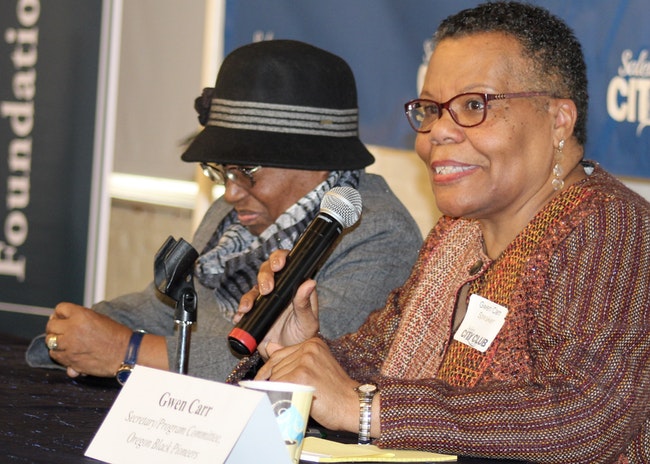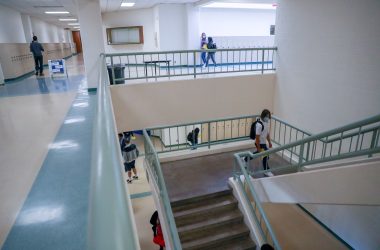
Willie Richardson and Gwen Carr of Oregon Black Pioneers tell of their work to explore and recover black history in Oregon. They addressed the Salem City Club on Friday, Feb. 7. (Casey Chaffin – Special to Salem Reporter)
Leaders of Oregon Black Pioneers outlined how black history has been neglected in Oregon in a presentation Friday before the Salem City Club.
Willie Richardson, a Salem resident and president of the group, and Gwen Carr, also of Salem and the group’s secretary, told of the group’s museum exhibits and efforts to bring light to the history of black Oregonians.
“I think for the most part people don’t think there is any Oregon black history,” Richardson said.
When representatives from the Oregon Black Pioneers give talks throughout the state, “It’s usually a surprise for everyone in the room,” she said. “I hope that’s going to change fairly soon.”
The Oregon Black Pioneers’ mission is to research and preserve black history in Oregon as well as educate others about that history. This includes combing research archives and creating curriculum that accurately represents African American history. Two bigger projects in the works for the organization, Richardson said, are a digital museum of black Oregon history and eventually a brick and mortar museum somewhere in the state.
“Our goal is to get this history out in every form we have,” Richardson said.
Ignoring African American history is common, Richardson said, noting that African Americans aren’t typically in stories of the Oregon Trail.
“We got here some kind of way,” Richardson said to laughs from the audience.
Throughout her talk, Carr presented archival photos and documentation of black people in Oregon. In one 1917 newspaper article about a black woman donating money to charity in Salem, the woman’s name “is never mentioned,” Carr said.
“That’s why black history is so hard to trace. So much has been lost,” Carr said.
This is especially significant, the women noted, because reality isn’t fully depicted.
“Oregon’s racial history is not the greatest,” Carr said. “Even though Oregon was a free state, slavery and slaves did exist in Oregon.”
The state came into the Union with black exclusion laws, making it illegal for black people to settle in Oregon.
“There was never the intention for black people to live here from the earliest of times,” Carr said.
But there have been black people in Oregon since the beginning. That’s why the group’s museum exhibit focuses on the civil rights movement – to illustrate how hard African Americans had to fight for recognition and equity in Oregon, Carr said.
Richardson and Carr also noted that there are plenty of flaws in remembering black history.
“In the last few months, the rumblings have been out there to rewrite history, the implication we are all immigrants in America,” Richardson said. “I remind you that is not true. The Native American was here before the first ship landed and the slave was snatched and brought here.”
The bottom line, the women said, is to tell the real history of Oregon, not a convenient or contrived one.
“I’m not here to make you feel guilty about anything your forebears did,” Carr said, addressing a largely white audience. “We just want truth. And if you’re about truth you can help us get there.”
The Oregon Black Pioneers are looking for researchers and community partnerships. Email [email protected] to get involved.
The Salem City Club hosts semi-monthly forums to engage the community on relevant issues. Visit salemcityclub.com to learn about upcoming events.
 Audience members listen as Willie Richardson and Gwen Carr of Oregon Black Pioneers tell of their work to explore and recover black history in Oregon. They addressed the Salem City Club on Friday, Feb. 7. (Casey Chaffin – Special to Salem Reporter)
Audience members listen as Willie Richardson and Gwen Carr of Oregon Black Pioneers tell of their work to explore and recover black history in Oregon. They addressed the Salem City Club on Friday, Feb. 7. (Casey Chaffin – Special to Salem Reporter)
 Willie Richardson and Gwen Carr of Oregon Black Pioneers tell of their work to explore and recover black history in Oregon. They addressed the Salem City Club on Friday, Feb. 7. (Casey Chaffin – Special to Salem Reporter)
Willie Richardson and Gwen Carr of Oregon Black Pioneers tell of their work to explore and recover black history in Oregon. They addressed the Salem City Club on Friday, Feb. 7. (Casey Chaffin – Special to Salem Reporter)









